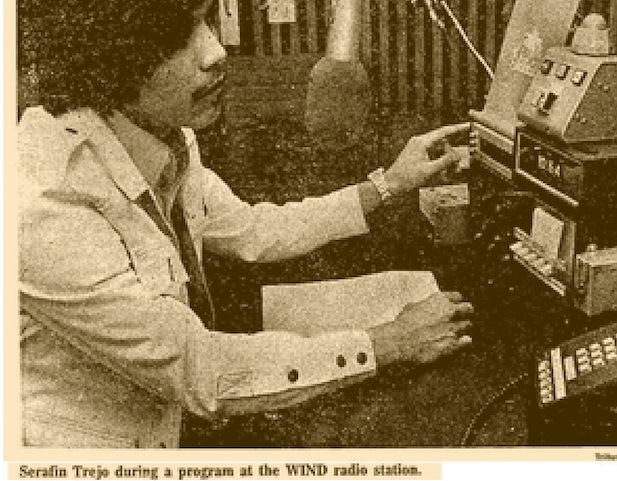From a 1974 article about Serafin Trejo, including his investigative reporting about Boogie on WIND.
This is the third entry about David “Boogie” Gonzalez. Despite what I learned from the Chicago Today article, interviewing Big and talking to people on social media, there’s a lot more to know. One thing I know is that he did dangerous and difficult work to reduce harm and uplift his community- and he died in the process. A detail from the Chicago Today article, linked in the previous entry, mentions that they marked the truce between gangs with an El Chicano concert at Nuevo Leon in La Villita. I like to imagine the fliers for the show and the people waiting in line winding down 26th street. I found a video of El Chicano from around the same time, and I watch it and imagine them playing to celebrate a gang truce in Chicago in 1973.
Artists painted a mural in his honor. El Mañana editor and reporter Gorky Tellez wrote about Boogie and his memorial march. Leonard Aronson, the Chicago Today journalist reporting on Pilsen noted that Boogie’s life and death was barely covered by the mainstream Chicago media because of other events that day. Now, Boogie’s mural is peeling away on a building rumored to have been sold, and it seems inevitable it will be gone soon. But the community named a park after him, and locals will continue to call it Boogie Park.
More than any other remaining questions, I want to know what changed Boogie’s trajectory and set him on the new path. Was he part of the growing Chicano youth movement in Pilsen? Had he attended one of the organizing meetings in the southwest? Was it the influence of labor, housing and education justice organizer Rudy Lozano? What ever happened to the 3 hour interview he did with Serafin Trejo? What would Hery Villagomez say about their work together? Since we was a youth worker at Centro de la Causa, did he leave any records of the organizing he was doing?
I am also curious about the street organizations participated in the truce. I want to know what dynamics Boogie and Henry Villagomez brought to peacemaking because they were both former Morgan Deuces. Boogie’s older brother was “Crazy Tony” one of the founders, and I wonder if this weighed on him- or others who were part of the truce.
There are a lot more people to interview.
